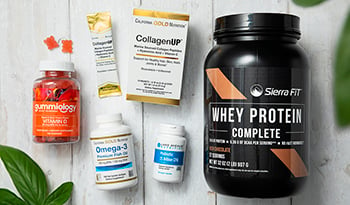The Best Supplements for Boosting Focus and Attention
DISCLAIMER:This blog does not intend to provide diagnosis...
- In this article:
- Always Start with Foundational Nutrition
- Quality Sleep Is Required for Proper Brain Function
- Melatonin, Methylcobalamin, and Sleep-Wake Cycle Disturbance
- The Best Supplements for Focus and Attention
- 1. Iron and Brain Function Benefits
- 2. GABA's Cognitive, Stress, and Memory Benefits
- 3. Caffeine + L-Theanine and Focus Benefits
- 4. Ashwagandha and Mental Benefits
- 5. CoQ10 + PQQ's Memory and Cognition Benefits
- 6. Huperzine-A (Hup A) and Concentration Benefits
- Takeaway

Brain cells are the most complex, long-living, and nutritionally demanding cells in the body. Scientific studies have shown that intelligence, memory, behavior, and concentration are all influenced by proper brain nutrition. Young or old, our nutritional status plays a vital role in determining how well we think and function.
This article highlights some critical dietary supplements that are especially useful in promoting improved focus and attention at various ages. These supplements also help fight off mental fatigue.
Always Start with Foundational Nutrition
First, we must consider foundational nutrition and supplements to help support overall health and brain health.
These foundational supplements support the basic function of brain cells, including the health of cell membranes and the production of energy by the mitochondria, the energy-producing compartments in cells.
The importance of this foundational approach cannot be stressed enough. The brain requires a complete orchestra of nutrients to perform its symphony of functions.
1. Multivitamin
Multivitamins provide nutrients essential to the proper brain and nervous system function, including thiamin, niacin, vitamin B6, vitamin B12, copper, iodine, iron, magnesium, manganese, potassium, and zinc. A deficiency of these essential nutrients will result in impaired energy production and decreased brain and nervous system function.
2. Fish Oils
Fish oils are rich in the omega-3 fatty acids eicosapentaenoic acid (EPA) and docosahexaenoic acid (DHA). These fatty acids are critical to brain function at any age, but the developing brain primarily depends upon adequate levels of these critical building blocks. Numerous studies have now shown that omega-3 (EPA+DHA) supplementation tremendously affects brain health in children and adults. The recommended dosage for children is 600 to 1,000 mg of EPA+DHA daily, while adults should target intake at 1,000 mg of EPA+DHA daily.
3. Flavonoid-Rich Extracts
Grape seed, pine bark, blueberries, cacao, and resveratrol are rich sources of flavonoids. Clinical studies have shown a variety of high-flavonoid sources produce beneficial effects on improving brain function, including immediate measurements of enhanced focus, attention, and cognition in children and adults. However, while effects are often produced immediately, the effects over time with continued consumption are even more noticeable. The best choice for most is grape seed extract at 100 to 200 mg daily. For people over 50, resveratrol at a dosage of 1,000 mg per day may support brain function best.
Quality Sleep Is Required for Proper Brain Function
Quality sleep is critical to the ability to focus and concentrate. Without enough quality sleep, there is a reduced clearing of toxins and overall brain energy. Toxin buildup and decreased energy production in the brain is like a dimmer switch on brain function.
Many people barely have enough energy to make it through the day and suffer from brain fog the longer the day goes on. Therefore, focusing on getting enough high-quality sleep is a critical goal.
One of the issues that can lead to poor sleep quality and insufficient focus, attention, and concentration is a disturbed sleep-wake cycle. This disorder is characterized by excessive daytime sleepiness, restless nights, and frequent nighttime awakenings. It is like being jet-lagged all the time. It is pervasive in people with poor sleep quality, shift workers, and the elderly.
Melatonin, Methylcobalamin, and Sleep-Wake Cycle Disturbance
For sleep-wake cycle disturbance, I recommend melatonin forty-five minutes before bed and methylcobalamin (the active form of vitamin B12) upon arising. Methylcobalamin has been shown to help some people suffering from sleep-wake disorder improve sleep quality, daytime alertness, and concentration. It also enhances mood.
I also recommend taking magnesium at bedtime. Magnesium at nighttime produces a calming effect, helps to relieve stress, and promotes restful sleep. Magnesium citrate, malate, or bis-glycinate are the better forms of magnesium.
For more information, read my article The 6 Best Natural Supplements for Sleep if you struggle to get a good night's sleep.
The Best Supplements for Focus and Attention
While the supplements above support the brain's ability to stay focused, additional support is often necessary, especially the older we get. Consider the following key recommendations to improve focus and attention.
1. Iron and Brain Function Benefits
I want to highlight the importance of adequate iron levels and the ability to focus and maintain attention. Iron is the most common nutrient deficiency in children, vegans, menstruating women, and the elderly. It is likely the most important nutritional cause of poor brain function.
Low iron status is associated with decreased attentiveness; shorter attention span; decreased persistence; and decreased ability to perform complex mental functions. Fortunately, iron supplementation has been shown to benefit cognitive function. Iron is critical not only for its role in carrying oxygen on red blood cells but also because it functions in enzymes involved in energy production in the brain and body.
Research has demonstrated that even a slight iron deficiency leads to impaired brain function in children and adults. Studies have shown that restoring adequate iron stores brought about a complete resolution of these issues.
For those under 18, supplementation at the Recommended Dietary Intake (RDI) level is recommended. For those over 18 years of age, iron status can be assessed in those at risk of deficiency through a blood test known as serum ferritin.
The best forms of iron are ferrous bisglycinate and ferric pyrophosphate. Both are free from gastrointestinal side effects common to other forms of iron.
2. GABA's Cognitive, Stress, and Memory Benefits
Clinical studies have recently indicated that the natural form of gamma-amino-butyric acid (GABA), PharmaGABA, can help improve mental performance in children and adults. It also helps to promote improved sleep quality.
PharmaGABA stimulates the production of alpha brain waves while also reducing beta waves (associated with nervousness, scattered thinking, and hyperactivity). Increasing alpha waves promotes more focused thinking. And it also provides help for those who have trouble falling asleep and staying asleep because their minds refuse to shut down at night.
There have been several interesting clinical studies with PharmaGABA. One study conducted in Japan by researchers from the Kyorin University Medical School divided sixth-grade students into two groups: 100 mg of PharmaGABA or a placebo. The students then took a math test and were evaluated for signs and feelings of stress. The results were quite dramatic. The average number of answers answered by the PharmaGABA group was 20% higher than the placebo group, and the number answered correctly also increased by 20%. These results indicate that PharmaGABA helped the kids think faster and get more answers correct.
The study also looked at critical markers of stress, such as the amount of a stress-related hormone in saliva and experienced anxiety levels during the study. Both subjective and objective measures of stress indicated the PharmaGABA group was considerably more relaxed and focused than the placebo group.
PharmaGABA has also helped adults in clinical studies. For example, in a study of adults over 40, PharmaGABA was shown to help control and maintain attention. It also enhanced the ability to reason and understand visual or abstract information. As a result, PharmaGABA is the first substance shown to improve logical thinking. It also improved both short-term and long-term memory.
PharmaGABA is an excellent choice if poor concentration and focus are due to feelings of stress or anxiety. Higher brain functions (like critical thinking) function better when relaxed. Stress hormones like cortisol can interfere with higher brain functions. Fortunately, PharmaGABA can reduce cortisol and promote feelings of relaxation, but with higher brain energy and the ability to focus.
3. Caffeine + L-Theanine and Focus Benefits
Caffeine is an effective tool to enhance brain activity and increase alertness and focus. Caffeine intake is associated with increased speed in performing repetitive tasks with fewer mistakes.
Coffee is the most popular source of caffeine, but it is also found in green and black tea and guarana. It is also available as a dietary supplement or over-the-counter medicine to fight drowsiness.
One of the ways coffee works is by blocking the binding of adenosine to brain cell receptors. When adenosine binds to these receptors, it promotes sleep. Adenosine levels build up during the day and eventually make us drowsy. Caffeine has a similar molecular structure to adenosine. So, it blocks its effects and makes us feel more alert or, at higher dosages, extremely alert. Caffeine also activates the release of other neurotransmitters, such as dopamine and serotonin. Most people can tolerate 150 to 200 mg of caffeine daily or one to two cups of coffee.
For those sensitive to the stimulant effects of caffeine, I suggest a lower amount of caffeine (40 to 75 mg) and 100 mg of L-theanine. Several studies have used this combination of caffeine, and L-theanine successfully improves alertness, attention, and cognitive functions, including a study in young boys ages 8 to 15. The studies compared the effects of the combination vs. caffeine or L-theanine alone. And what they found was that the mixture produced by far the most significant improvements.
Green tea, especially matcha, is a source of caffeine and L-theanine and can be used as a beverage source of these compounds. If children or adults do not like the daily habit of drinking matcha or adding it to the diet in some other manner, then I recommend simply trying L-theanine in supplemental form. L-theanine alone has also shown considerable effects in boosting cognitive function in adults at a dosage of 200 mg per day.
Like PharmaGABA, L-theanine stimulates the production of alpha brain waves while reducing beta waves. PharmaGABA and L-theanine buffer the negative effects of caffeine's anxiety-producing actions while enhancing caffeine's positive effects on improving focus and attention. L-theanine was also shown to enhance sleep quality in boys between the ages of 8 to 12-years old at a dosage of 200 mg twice daily.
4. Ashwagandha and Mental Benefits
Ashwagandha (Withania somnifera)is emerging as a true botanical superstar for improving mental and physical performance, improving sleep quality, dealing with stress, and boosting energy levels.
Foremost, ashwagandha is an adaptogen to help us deal with stress. And stress is a significant factor in interfering with our ability to think, concentrate, and maintain attention. Several clinical studies have shown that ashwagandha improves brain function in various test measures, including focus, concentration, and the ability to think (cognitive function).
There are many reasons for these benefits, including ashwagandha components protecting and enhancing specific areas in the brain. Still, the most considerable effects may be ashwagandha improving sleep quality and our ability to deal with stress.
Though ashwagandha is helpful in adolescents through old age, it is beneficial in early adulthood as this time is often the most stressful.
5. CoQ10 + PQQ's Memory and Cognition Benefits
Coenzyme Q10 (CoQ10) and pyrroloquinoline quinone (PQQ) are two mitochondrial enhancers that have been shown to work together well to boost memory and cognition. CoQ10 is very well known, but PQQ is just beginning to get popular. PQQ is a powerful antioxidant that protects explicitly against mitochondrial damage. It also promotes the spontaneous generation of new mitochondria within aging cells, a process known as mitochondrial biogenesis. This effect is why PQQ is so exciting as an anti-aging strategy.
While PQQ is effective on its own, when combined with coenzyme Q10, even better results have been noted. In one study of 71 middle-aged and older adults aged between 40-70, supplementation with 20 mg per day of PQQ resulted in improved tests of higher cognitive function compared to the placebo group. Still, the results were even more dramatic in the group receiving 20 mg of PQQ and 300 mg of CoQ10. PQQ and CoQ10 are involved in mitochondrial energy production, so these results are unsurprising.
For people over the age of 50 years, taking specific dietary supplements that enhance mitochondrial function, such as coenzyme Q10 (CoQ10) and pyrroloquinoline quinone (PQQ), can help improve focus and attention as well as memory and cognitive function.
6. Huperzine-A (Hup A) and Concentration Benefits
Huperzine-A (Hup A) is a naturally occurring compound in Chinese club moss (Huperzia Serrata). Hup A has been extensively studied including its use in double-blind clinical trials showing it to that produce meaningful effects in improving concentration, poor memory, and cognition. Hup A acts by inhibiting the breakdown of the important brain compound acetylcholine important to memory and concentration. By preventing the breakdown of acetylcholine, Hup A improves the ability to focus, think, and recall memories.
Hup A also prevents brain cell damage caused by various neurotoxins, enhances the activities of the brain's antioxidant enzymes, and promotes the formation of new brain cells. The typical dosage of Hup A is 200 mcg twice daily. Be sure to use pure Hup A and not crude Huperzia preparations for safety and efficacy.
Takeaway
Optimal brain function requires a health-promoting diet and lifestyle. Dietary supplements can further support brain health, translating to significant improvements in focusing and maintaining attention. However, dietary supplements can only partially compensate for a poor diet and a lack of quality sleep. Keep that in mind and take a long-term approach to build brain health, whether young or old.
References:
- Nogueira-de-Almeida CA, Zotarelli-Filho IJ, Nogueira-de-Almeida M, et al. Neuronutrients and Central Nervous System: A Systematic Review. Cent Nerv Syst Agents Med Chem. 2022 Nov 21.
- Hardy AL, Pouteau E, Marquez D, et al. Vitamins and Minerals for Energy, Fatigue and Cognition: A Narrative Review of the Biochemical and Clinical Evidence. Nutrients. 2020 Jan 16;12(1):228. Dighriri IM, Alsubaie AM, Hakami et al. Effects of Omega-3 Polyunsaturated Fatty Acids on Brain Functions: A Systematic Review. Cureus. 2022 Oct 9;14(10):e30091
- Andriambelo B, Stiffel M, Roke K, Plourde M. New perspectives on randomized controlled trials with omega-3 fatty acid supplements and cognition: A scoping review. Ageing Res Rev. 2023 Mar;85:101835.
- Ramezani M, Meymand AZ, Khodagholi F, et al. A role for flavonoids in the prevention and/or treatment of cognitive dysfunction, learning, and memory deficits: a review of preclinical and clinical studies. Nutr Neurosci. 2023 Feb;26(2):156-172.
- Yang W, Cui K, Li X, et al. Effect of Polyphenols on Cognitive Function: Evidence from Population-Based Studies and Clinical Trials. J Nutr Health Aging. 2021;25(10):1190-1204.
- Buglio DS, Marton LT, Laurindo LF, et al. The Role of Resveratrol in Mild Cognitive Impairment and Alzheimer's Disease: A Systematic Review. J Med Food. 2022 Aug;25(8):797-806.
- Li T, Jiang S, Han M, et al. Exogenous melatonin as a treatment for secondary sleep disorders: A systematic review and meta-analysis. Front Neuroendocrinol. 2019;52:22-28.
- Honma K, Kohsaka M, Fukuda N, et al. Effects of vitamin B12 on plasma melatonin rhythm in humans. Increased light sensitivity phase-advances the circadian clock? Experentia 1992;48:716–20.
- Okawa M, Mishima K, Hishikawa Y, et al. Vitamin B12 treatment for sleep-wake rhythm disorders. Sleep 1990;13:1–23.
- Abbasi B, Kimiagar M, Sadeghniiat K, et al. The effect of magnesium supplementation on primary insomnia in elderly: A double-blind placebo-controlled clinical trial. J Res Med Sci. 2012 Dec;17(12):1161-9.
- Held K, Antonijevic IA, Künzel H, Uhr M, Wetter TC, Golly IC, Steiger A, Murck H. Oral Mg(2+) supplementation reverses age-related neuroendocrine and sleep EEG changes in humans. Pharmacopsychiatry. 2002 Jul;35(4):135-43. doi: 10.1055/s-2002-33195. PMID: 12163983.
- Pivina L, Semenova Y, Doşa MD, et al. Iron Deficiency, Cognitive Functions, and Neurobehavioral Disorders in Children. J Mol Neurosci. 2019 May;68(1):1-10.
- Sheema UK, Rawekar A. P300, a tool for cognitive assessment in women with iron deficiency anemia: A systematic review. J Family Med Prim Care. 2022 Jun;11(6):2320-2326.
- Abdoua AM, Higashiguchia S, Horiea K, et al. Relaxation and immunity enhancement effects of Gamma-Aminobutyric acid (GABA) administration in humans. BioFactors 2006;26:201–208
- Lomagno KA, Hu F, Riddell LJ, et al. Increasing iron and zinc in pre-menopausal women and its effects on mood and cognition: a systematic review. Nutrients. 2014 Nov 14;6(11):5117-41.
- Konagai C, Nakamura K, Koga Y, et al. Effect of PharmaGABA on reduction of school child's study stress effect. Japanese Society Nutrition Food Science. 2008;62:172.
- Yamatsu A, Nakamura U, Saddam HM, et al. Intake of 200 mg / day of gamma-aminobutyric acid (GABA) improves a wide range of cognitive functions. Jpn Pharmacol Ther 2020;48 (3):461‐474
- Kahathuduwa CN, Dassanayake TL, Amarakoon AMT, Weerasinghe VS. Acute effects of theanine, caffeine and theanine-caffeine combination on attention. Nutr Neurosci. 2017 Jul;20(6):369-377.
- Kahathuduwa CN, Wakefield S, West BD, Blume J, Dassanayake TL, Weerasinghe VS, Mastergeorge A. Effects of L-theanine-caffeine combination on sustained attention and inhibitory control among children with ADHD: a proof-of-concept neuroimaging RCT. Sci Rep. 2020 Aug 4;10(1):13072.
- Dodd FL, Kennedy DO, Riby LM, Haskell-Ramsay CF. A double-blind, placebo-controlled study evaluating the effects of caffeine and L-theanine both alone and in combination on cerebral blood flow, cognition and mood. Psychopharmacology (Berl). 2015 Jul;232(14):2563-76.
- Giesbrecht T, Rycroft JA, Rowson MJ, De Bruin EA. The combination of L-theanine and caffeine improves cognitive performance and increases subjective alertness. Nutr Neurosci. 2010 Dec;13(6):283-90.
- Hidese S, Ogawa S, Ota M, et al. Effects of L-Theanine Administration on Stress-Related Symptoms and Cognitive Functions in Healthy Adults: A Randomized Controlled Trial. Nutrients. 2019;11(10):2362.
- Lyon MR, Kapoor MP, Juneja LR. The effects of L-theanine (Suntheanine®) on objective sleep quality in boys with attention deficit hyperactivity disorder (ADHD): a randomized, double-blind, placebo-controlled clinical trial. Altern Med Rev. 2011 Dec;16(4):348-54.
- Mukherjee PK, Banerjee S, Biswas S, Das B, Kar A, Katiyar CK. Withania somnifera (L.) Dunal - Modern perspectives of an ancient Rasayana from Ayurveda. J Ethnopharmacol. 2021 Jan 10;264:113157.
- Langade D, Kanchi S, Salve J, Debnath K, Ambegaokar D. Efficacy and Safety of Ashwagandha (Withania somnifera) Root Extract in Insomnia and Anxiety: A Double-blind, Randomized, Placebo-controlled Study. Cureus. 2019 Sep 28;11(9):e5797.
- Zahiruddin S, Basist P, Parveen A, et al. Ashwagandha in brain disorders: A review of recent developments. J Ethnopharmacol. 2020 Jul 15;257:112876.
- Jonscher KR, Chowanadisai W, Rucker RB. Pyrroloquinoline-Quinone Is More Than an Antioxidant: A Vitamin-like Accessory Factor Important in Health and Disease Prevention. Biomolecules. 2021;11(10):1441.
- Nakano M, Ubukata K, Yamamoto T, Yamaguchi H. Effect of pyrroloquinoline quinone (PQQ) on mental status of middle-aged and elderly persons. FOOD Style. 2009;21:13(7):50-3.
- Tun MK, Herzon SB. The pharmacology and therapeutic potential of (-)-huperzine A. J Exp Pharmacol. 2012 Sep 5;4:113-23.

 By Dr. Michael Murray, N.D.
By Dr. Michael Murray, N.D. 


